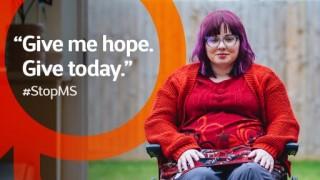
We’re in the spring phase of our ambitious Stop MS Appeal to raise £100 million. We’ve been focusing on the impact research can have on those living with MS and the hope that it offers.
And the research we fund has very much been in the spotlight in the past week or so. Because our revolutionary clinical trial Octopus has started recruitment at its first hospital site in London. This means the first few people with primary and secondary progressive MS have begun taking part.
Our pioneering researchers have spent years putting everything in place to make this world-first trial a reality. This multi-arm, multi-stage (MAMS) trial will transform the way we test treatments for progressive MS.
Octopus will make it possible to test new treatments up to three times faster by:
Testing multiple drugs at once – and comparing them with a single control group.
Using Magnetic Resonance Imaging (MRI) scans to get an idea of whether a drug looks like it has potential, many months before we’d be able to see an effect of the drug on disability progression. Promising-looking drugs stay in the trial, with hundreds more people joining the existing participants. So, what would normally be two consecutive trials are delivered in one.
Adding the flexibility to drop drugs that don’t look promising, and slot in new drugs as they’re discovered.
Watch a short animation about how Octopus will work.
Lead researcher, Professor Jeremy Chataway, said: “The multi-arm, multi-stage approach to trialing emerging medications has been utterly transformative in other conditions.
So I’m thrilled we’re now able to apply it to progressive MS. Ultimately, Octopus will lead to more treatments for progression becoming available to people living with MS sooner.”
Dr Emma Gray, our Assistant Director of Research, said: “Launching the world’s first multi-arm, multi-stage trial for MS has long been an ambition of ours. And opening the doors to Octopus is a momentous milestone.
This is a major moment for MS research – Octopus has the potential to change the clinical trials landscape around the world. It's thanks to all the wonderful participants that trials, like Octopus, can happen. We won’t stop until we have treatments that transform the lives of everyone with MS.”
Read more on Octopus in our latest news update.
Announcing Octopus
We worked with BBC journalist Caroline Wyatt – who lives with MS – on an exclusive piece for BBC News. This features one of the first participants, Ailsa, from Surrey. Ailsa lives with secondary progressive MS and is not eligible for any existing treatments. The BBC spoke with Ailsa at home and followed her experience at Queen Square Hospital where she was accepted onto the trial and given her first round of treatment.
Read Caroline’s article on the BBC website.
The story was also featured on the BBC One 6pm and 10pm news bulletins and on BBC Radio Four PM programme (from 00:27:35).
Separately Ailsa was interviewed live by BBC Radio Leeds, BBC Radio West Midlands, BBC Radio Stoke, BBC Radio Cumbria and BBC Radio Lancashire.
Caroline Wyatt was also interviewed live on BBC 5 Live Drive (from 01:40:30) alongside Professor Jeremy Chataway. And Ailsa and Professor Chataway were interviewed live on BBC Radio Surrey.
Having broken on the BBC, the story was then picked up elsewhere.
Our PR Manager, Samantha Banks, said: "Working on a BBC exclusive to announce the opening of Octopus is by far one of my work highlights! Not only was it a privilege to collaborate with journalist Caroline Wyatt – who lives with MS – but it was great getting to know one of the trial’s first participants’, Ailsa.
Having the story feature on BBC News at 6pm and 10pm was an invaluable opportunity, and one that meant we were able to raise awareness of MS to millions of people.”
Getting involved in Octopus
Of course, it takes a lot of people to get a research project of this size and scope off the ground. From healthcare professionals to researchers to volunteer participants — every individual makes an important contribution.
Read about some of the people helping to make Octopus a success.
And if you (or someone you know) would also like to get involved, you can express your interest through the UK MS Register.
When you register, you’ll be asked where you live. This is so the closest trial sites can contact you when they start recruiting. For most people, this won’t happen for quite a while. This is because trial sites are still getting set up and over 1000 people have already registered their interest.
University College London Hospital is the only site currently open. But there will eventually be up to 30 sites around the UK, including in Scotland, Wales, Northern Ireland, Yorkshire, the West Midlands and the South of England.
You can also read about other trials for progressive MS we support on our Take Part in Research web page.


